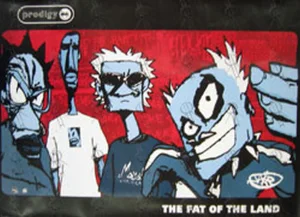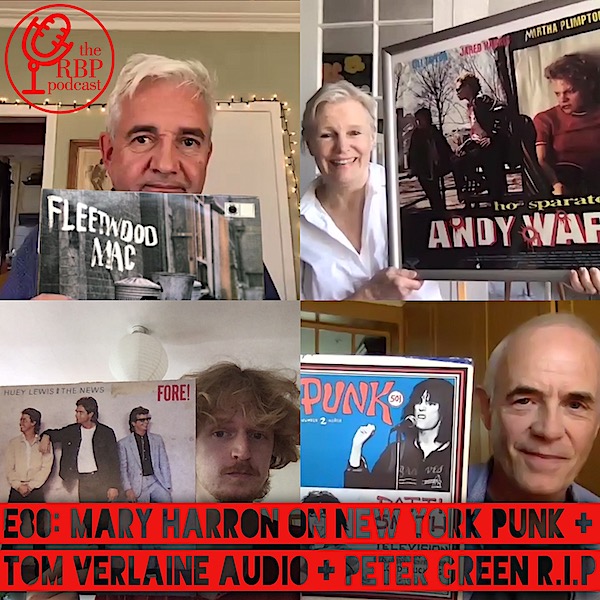
I can’t pretend I adored the Prodge, but when Rolling Stone asked me to review The Fat Of The Land I declared it was “a thrilling, intoxicating nightmare of a record”. I think it still is. And poor Keith Flint was undoubtedly one of the most disturbingly exciting front men the world has ever seen. Here’s the review, published 7th August, 1997…
RARELY HAS a pop trend been so shamelessly spoon-fed to America as the hold-all genre dubbed “electronica”. Rarely, indeed, has the music industry tried so hard to convince us that the Next Big Thing is in fact a done deal – that another wave of English boys holds the future in its hands and we’d better get used to it.
Lately, dissenting voices have questioned the wisdom of the electronica hype. Geeky boys with keyboards may find in-crowd success in the country’s hipper conurbations, they argue, but the Chemical Brothers will never rock Cleveland. Enter the Prodigy, four manic street ravers from working-class Essex, with their bullishly-titled third album The Fat Of The Land. To say that the Prodigy are anything but self-effacing synth nerds would be a comical understatement. To suggest that they are the Sex Pistols of techno would not be such an exaggeration. What the Prodigy have done, quite simply, is to drag techno out of the communal nirvana of the rave and turn it into outlandish punk theater. And they’ve done it brilliantly.
The group’s chief weapon, of course, is not their menacing cyber-yobbo frontman Keith Flint, or their leering dancer-rappers Maxim and Leeroy Thornhill, but their one-man engine-room Liam Howlett. A loopy genius of the µ-Ziq or Aphex Twin variety he may not be, but on The Fat Of The Land Howlett has gone boldly where no techno maestro has gone before, easily surpassing the band’s 1994 opus Music For A Jilted Generation and fashioning some of the most ferociously exciting music of the year so far.

The point about The Fat Of The Land is that it packs all the visceral punch of rock at its incendiary best – not least on the frantic, panic-inducing ‘Firestarter’. There is nothing genially Kraftwerkish about Howlett’s seismic bass grooves or skittering drum programs. There’s no soothing cosmic-prog balm about his shrieking machines. Nor is he exactly shy about his rock references. Crunching guitars abound on the album, and a moshworthy cover of L7’s ‘Fuel My Fire’ rounds it out. ‘Climbatize’ all but steals the pulsing pre-climax keyboard riff of the Who’s ‘Won’t Get Fooled Again’, and the savage ‘Serial Thrilla’ (sampling Skunk Anansie’s ‘Selling Jesus’) is as rabid as any Rage Against The Machine track. The debt to the Pistols, meanwhile, is only too explicit in the chorus of ‘Breathe’, a thrilling paean to drug psychosis which has already topped the charts in eight countries.
Howlett laboured on The Fat Of The Land for the better part of two years, and the results speak for themselves. His grasp of rhythm and texture – and of basic song structure, come to that – has matured immeasurably from the days when the Prodigy were churning out frenetic rave novelties like ‘Charly’. He may reject the cerebral world of ambient, but he has also left behind the hyperventilated hardcore techno of old. Squelching synths bounce round each other on ‘Mindfields’, creating a mesmerising funk force-field. On ‘Breathe’, everything drops out for eight bars to make way for a mournful, Joy Division-ish guitar riff. Voices from India and North Africa, alternately seductive and sinister, seep into ‘Narayan’ (a collaboration with Kula Shaker’s Crispian Mills) and the furious opening track ‘Smack My Bitch Up’. Only when Howlett opts for more conventional formulae – the old-school hyper-rave of ‘Funky Shit’ or the pounding hip hop of ‘Diesel Power’ (featuring the formidable Dr. Octagon) – does The Fat Of The Land lose its rollercoaster momentum.
The Prodigy are greeting the dystopian future with a crazed kind of glee: there is no pre-millenial tension on this, their third album. Nor do they appear to be very interested in the Sixties. Where the Chemical Brothers cast a fan’s eye back to the psychedelic past of ‘Tomorrow Never Knows’ and Lothar and the Hand People, the Prodigy are crafting futurist soundtracks for disenfranchised youth, populist electro-punk that serves as a perfect Brit counterpart to the industrial noir of Trent Reznor and the jittery soundscapes of Wu Tang’s RZA.
The Fat Of The Land is a thrilling, intoxicating nightmare of a record, an energy flash of supernova proportions. “This is dangerous,” spits Maxim on ‘Mindfields’; “Open up your head, feel the shell shock!” If America can accept Keith Flint as a psycho frontman – and accept the Prodigy’s essential in-your-face hooliganism while they’re about it – there’s no telling how far the band’s marriage of man and machine could take them.





